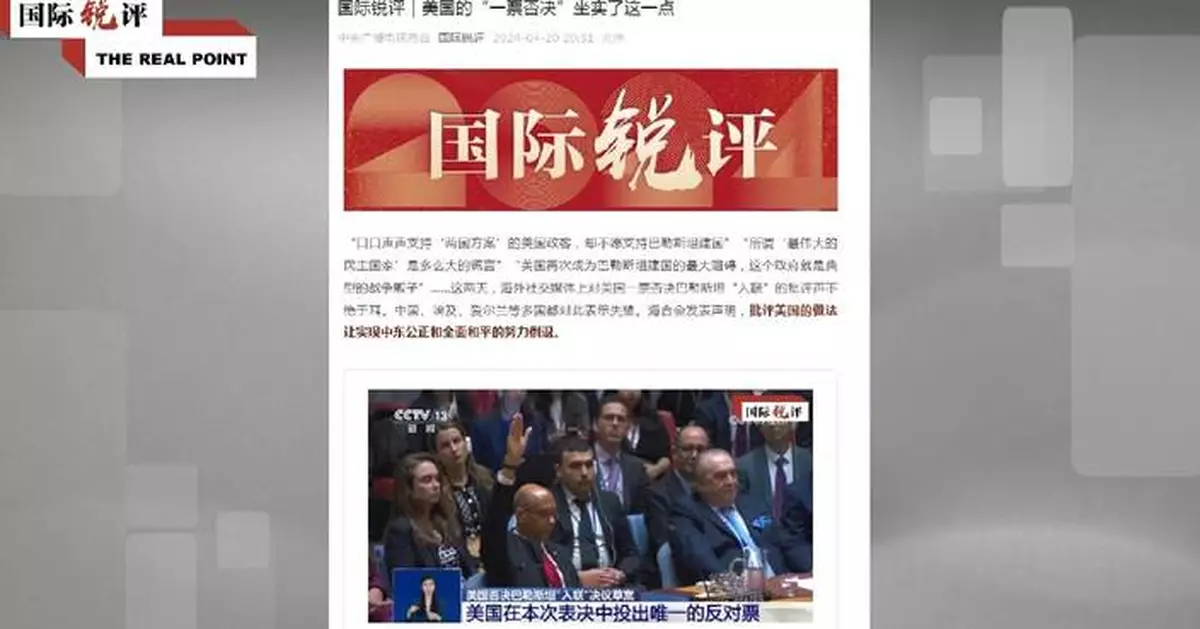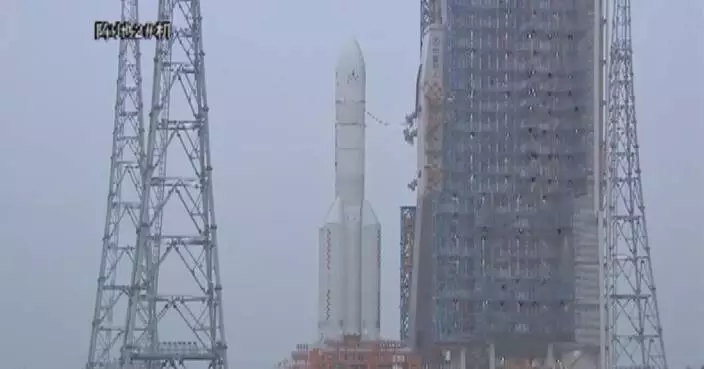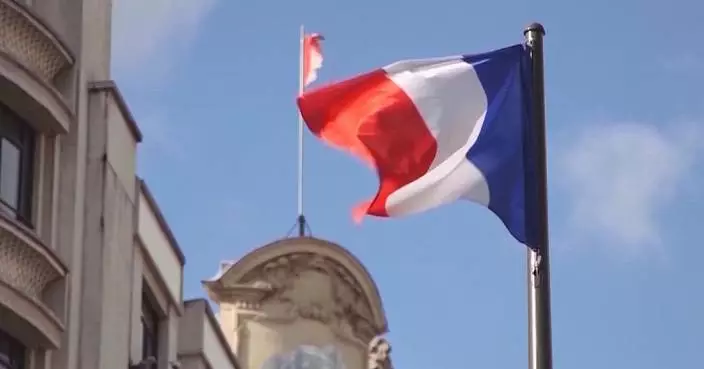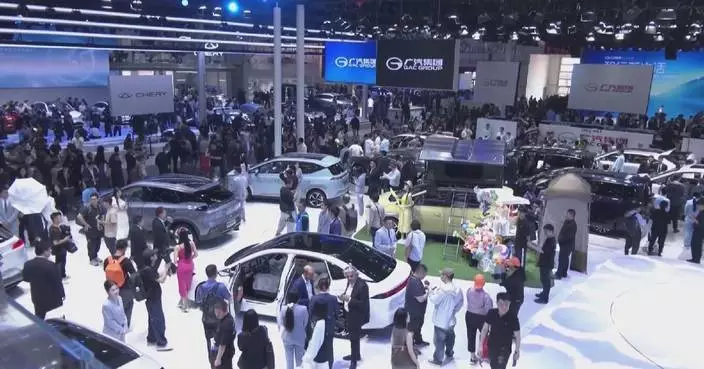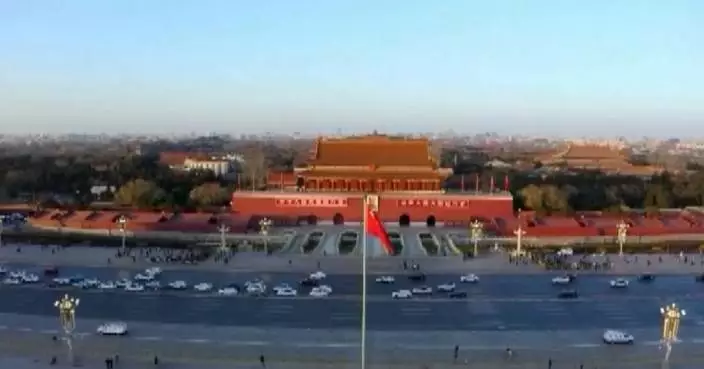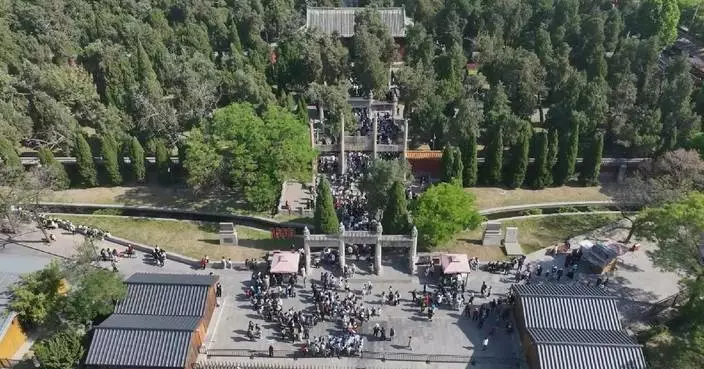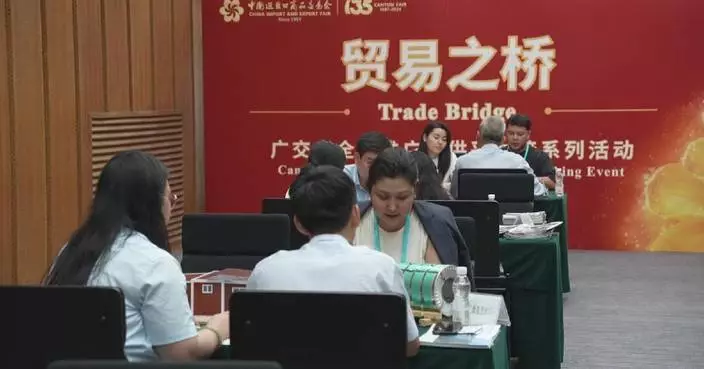In defiance of strong global desire for peace, the United States has once again pitted itself against the international community by vetoing a Palestinian request for full United Nations (UN) membership at the Security Council. This move has fully proven that the U.S. is a disrupter and saboteur in regional and international affairs, said a commentary published by China Media Group (CMG) on Saturday.
An edited English-language version of the commentary is as follows:
The social media has been flooded with blasts slamming the U.S. vetoing of a Palestinian request for full UN membership at the Security Council. Various nations, including China, Egypt and Ireland, expressed their disappointment at the U.S. decision.
The 15-member council voted on a draft resolution recommending to the 193-member UN General Assembly that "the State of Palestine be admitted to membership of the United Nations."
The draft resolution received 12 votes in favor, two abstentions and one vote against.
A council resolution needs at least nine votes in favor and no vetoes by the United States, Britain, France, Russia or China to pass. The United States, one of the permanent members of the Security Council, used its veto power after the draft secured 12 votes in favor.
While Gaza is suffering lingering wartime atrocities, the U.S. has failed to fulfill its obligation, and when the Palestinian people are demanding justice, the U.S. set up a stumbling block. It has once again exposed the hypocrisy and double standards of the U.S. regarding the Palestine-Israel issue, proving itself as a peace spoiler and war peddler in the Middle East.
Statehood has been the long-cherished dream of the Palestinian people. Historically, Palestine has been home to Jews, Christians, and Muslims. However, since modern times and the development of Zionism in the region, the path to achieving independent statehood for Palestine has been arduous and tortuous.
In 2011, the Palestinian Authority found it intractable to restrain Israel's continuous expansion of Jewish settlements through political means and struggled to effectively counter it. As a result, it turned to seek UN membership as its primary goal and formally applied to the UN that year.
With opposition from the U.S. and other countries, Palestine was eventually recognized by the UN General Assembly as a non-member observer state, without being granted voting rights
After a fresh wave of Israeli-Palestinian conflict erupted in October 2023, the Gaza Strip has become a bloody and devastating battlefield.
The Palestinian Authority found itself unable to effectively control the situation in Gaza, leaving it with the only option of seeking full UN membership. This move aims to mobilize broad support from the international community and exert pressure on Israel to promptly cease military operations in the Gaza Strip.
Many countries, including China, also believe that the admission of Palestine as a full member of the UN would grant it an equal status with Israel and create conditions for Palestine-Israel negotiations. However, the U.S. veto, once again, stifled the aspirations of the Palestinian people and the efforts of the international community.
All countries that genuinely support the two-state solution would cast their yes vote for Palestine to achieve full membership in the UN. However, it raises a moot question of why American politicians, while talking about the "two-state solution", have repeatedly dampened the hopes of the Palestinian people.
Analysts have pointed out that successive U.S. governments, motivated by the desire to solidify their hegemony in the Middle East and address domestic political concerns, have taken Israel as their most critical ally in the region with unwavering favoritism and indulgence. By siding with Israel, the U.S. vetoed the Palestinian request for full UN membership to serve its egoism and own profit maximizing.
On the other hand, the U.S. has always believed that any progress regarding the Palestinian-Israeli issue should be achieved under its own leadership. Therefore, if Palestine unilaterally applies for membership, it would undermine the leading role of the U.S. in the Palestinian-Israeli peace process.
For the U.S., ensuring its own interests is more crucial than whether Palestine and Israel can achieve peace.
At present, the Palestinian-Israeli conflict is continuing, and the humanitarian crisis is intensifying. The Ministry of Health in the war-ravaged Gaza Strip announced Friday that the death toll from ongoing Israeli attacks has exceeded 34,000 and the injuries reached 76,833.
As the primary third party involved in the Palestinian-Israeli issue, the U.S. has not provided sufficient assistance to the Gaza Strip. Instead, it has consistently supplied weapons and equipment to Israel and repeatedly exercised its veto power at the UN to block resolutions from other countries urging a ceasefire in Gaza.
Samir Ragheb, head of the Arab Foundation for Development and Strategic Studies in Egypt, criticized that "Everyone recognizes that those people were killed with U.S. weapons, deadly ammunition, and U.S. protection."
What is more worrying is that the spillover effects of the Palestinian-Israeli conflict continue to emerge.
The Middle East seems to be embroiled in a new cycle of retaliation and counter-retaliation following the disclosure by U.S. and Israeli officials that Israel conducted a 'limited' air strike in response to Iran.
The Palestinian issue lies at the heart of the Middle East conflict. Consequently, the urgency for the admission of Palestine as a full member of the UN has never been greater.
But ironically, U.S. Permanent Representative to the United Nations (UN) Linda Thomas-Greenfield claimed that she didn't believe that a draft UN resolution proposing full membership for Palestine in the organization could help reach a two-state solution and end the Israeli-Palestinian conflict.
Many questioned the U.S. representative about what can help achieve a two-state solution.
By consistently providing weapons to Israel and casting 'no' votes at the UN, these actions further demonstrate that the U.S. is indeed a disruptor and saboteur in regional and international affairs. When it comes to the future and destiny of the Palestinian people, no one should possess a veto power.

US veto against Palestinian request proves it as peace spoiler, war peddler: commentary


